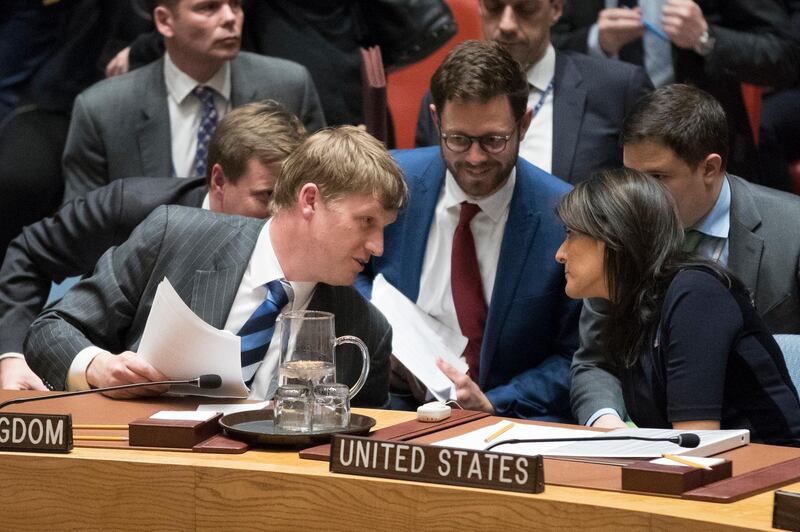Russia’s ambassador to the United Nations has said that “the only civilised way” of getting to the bottom of who is responsible for the assassination attempt against Sergei Skripal, a former Russian agent living in England, would be through a joint British-Russian investigation.
Vassily Nebenzia told an emergency meeting of the UN Security Council on Wednesday that was called by fellow permanent member Britain, that “Russia had nothing to do with this incident” and “we have nothing to fear and nothing to hide.”
He went on to accuse Britain of creating “a hysterical atmosphere” following the announcement by UK prime minister Theresa May that 23 suspected Russian intelligence agents operating out of the London embassy were to be expelled from the country.
Mr Nebenzia asked how the assassination attempt could benefit Russia on the eve of its presidential election and its hosting of soccer's World Cup, adding: “I can think of a number of countries that would benefit a great deal from this incident and accusing Russia of it.”
The UN meeting comes as the Trump administration strengthens its support for Britain. The White House said on Wednesday that the US “stands in solidarity” with its ally after the move by the UK in retaliation for Russia’s alleged use of a nerve agent against the former Russian spy and his daughter.
President Trump’s press secretary Sarah Sanders said America “shares the United Kingdom’s assessment that Russia is responsible” for the “abhorrent” attack.
Ms Sanders says the poisoning of Sergei Skripal fits into a pattern of Russia disregarding international law, undermining the sovereignty of other countries, and trying to “subvert and discredit Western democratic institutions and processes.”
_______________
Read more:
[ Britain to expel 23 Russian diplomats over nerve agent attack ]
[ Britain’s May says it’s ‘highly likely’ Russia poisoned Sergei Skripal ]
[ What is Novichok, the nerve agent believed to have been used against Sergei Skripal? ]
[ Salisbury: the medieval city at the centre of spy assassination bid ]
_______________
Earlier, Nikki Haley, the American ambassador to the UN, said the attack was part of “an alarming increase” in the use of chemical weapons — and says Russia is “a growing concern in all of this dangerous and destabilising activity.”
She said the US will stop complaining about Russia “if the Russian government stopped using chemical weapons to assassinate its enemies, and if the Russian government stopped helping its Syrian allies to use chemical weapons to kill Syrian children.”
Britain’s deputy UN ambassador Jonathan Allen said Russia informed the Organization for the Prohibition of Chemical Weapons, which monitors the convention last September, that it completed the destruction of its stockpiles and facilities.
But he told the security council that Russia never declared Novichok – the agent believed to have been used – which it was required to do, and therefore it is “in serious breach of the chemical weapons program.”
Mr Allen said that fact alone should negate any Russian arguments “about the possibility of other countries having inherited this technology.”
He said Russia “either did not care that the weapon used would be traced back to them, or mistakenly believed they could cover their traces.”
Britain knows there will be more threats and attacks from Russia denying any involvement, Mr Allen said.
“This is how Russia has acted in every other case where it has been caught flouting international law — denial, distraction and threats.”
But Britain won’t let threats “weaken our resolve” in standing “firm” for democracy, the rule of law “and the freedom of our people,” Mr Allen concluded.





